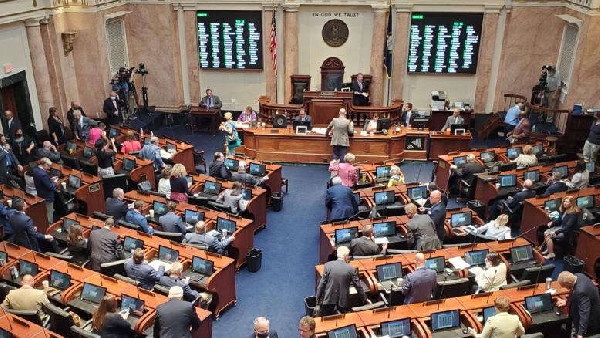Addressing the highest inflation rate in decades

FRANKFORT, Ky. (KT) – Addressing the highest inflation rate in decades - currently standing at around 7.5% - legislation was proposed Thursday that would provide a tax rebate to all working Kentucky taxpayers.
However, the director of the Kentucky Center for Economic Policy, said in the current form it leaves out low-income and older Kentuckians.
Senate Bill 194, sponsored by Sen. Christian McDaniel, R-Taylor Mill, originally was designed only to remove gender specific language when referring to the governor in budget document language. But during a special meeting of the Senate Appropriations and Revenue Committee, McDaniel introduced changes to the legislation, known as a committee substitute, that says each working Kentucky taxpayer would receive $500, with a maximum of $1,000 per household.
McDaniel says the tax rebate is possible because of conservative budgeting practices, with unexpected and exceptional revenue growth expected to yield over $1.94 billion in excess funds that belong to Kentucky taxpayers.
"As our nation is experiencing the highest inflation in 40 years, it's important that lawmakers respond in a way that helps ease the burden on tax-paying Kentuckians," he said.
The proposal takes advantage of the state's massive revenue surpluses. The one-time rebates are expected to cost the state up to $1.15 billion, McDaniel said. If the proposal becomes law, the rebates should be distributed to Kentuckians by the end of this summer, he said.
McDaniel said the proposal is “completely separate” for a broader tax overhaul measure that could be introduced soon by Republican lawmakers.
In a post on the Kentucky Center for Economic Policy website, Bailey says those who paid less than $500 as an individual or $1,000 as a family would be left out entirely or partially from the rebate in SB 194, despite working. For context, a parent of one child who worked full-time, year-round at the minimum wage would, at $15,080 in wages, receive no tax rebate at all under the bill.
He also said the bill also leaves out most all retirees, who do not pay the income tax. Kentucky does not tax Social Security income and exempts the first $31,110 in non-Social Security retirement income. Of Kentucky’s 547,000 retirees, the median non-Social Security income in 2019 was only $12,000, the average income was $20,147 and the income at the 75th percentile was $26,000.
Bailey adds, because of the way the rebate is structured, it may force some low-income Kentuckians to owe taxes next year. SB 194 is designed as an advance tax credit against 2022 taxes based on 2020 taxes paid. Taxable incomes for some laid-off workers were somewhat elevated in 2020 because of supplemental pandemic unemployment payments. If workers make less in 2022 through employment, they will receive the tax rebate this year but may owe that rebate back when they file their 2022 taxes early next year.
Some people who have retired since 2020 may also owe the rebate back, as will those Kentuckians who had income in 2020 but who are currently facing barriers to work like limited access to child and elder care, or long COVID.
The measure cleared the committee and now heads to the Senate floor.

 Kentucky's Governor Declares State of Emergency Ahead of 4-Day Severe Weather Event With Possible Tornadoes
Kentucky's Governor Declares State of Emergency Ahead of 4-Day Severe Weather Event With Possible Tornadoes
 Indiana Attorney General combats contraband cell phones in prisons
Indiana Attorney General combats contraband cell phones in prisons
 Kentucky State Police Traffic Safety Checkpoint
Kentucky State Police Traffic Safety Checkpoint






